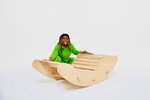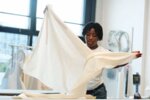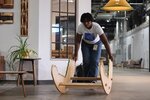Inventive creativity comes naturally to Nnennia Chikaodili Esther Mazagwu.
This item is available in full to subscribers.
We have recently launched a new and improved website. To continue reading, you will need to either log into your subscriber account, or purchase a new subscription.
If you are a digital subscriber with an active subscription, then you already have an account here. Just reset your password if you've not yet logged in to your account on this new site.
If you are a current print subscriber, you can set up a free website account by clicking here.
Otherwise, click here to view your options for subscribing.
Please log in to continue |




Inventive creativity comes naturally to Nnennia Chikaodili Esther Mazagwu, whose Nigerian family brought the craft-based traditions central to Igbo culture along with them when they immigrated to the U.S., arriving when the artist was just two years old.
“Craft and manufacturing have always excited me,” said Mazagwu, who is nonbinary and uses they/them pronouns. “As a young child, I spent lots of time tinkering and taking objects apart. My mom told stories about tailors, shoe cobblers and architects on her side of the family, and these stories stuck with me.”
Mazagwu, whose studio is on East Mermaid Lane in Chestnut Hill, recently completed a Dallas-based design competition called Creating Connections in which architects, designers, artists and fabricators from all over the world were challenged to create a public infrastructure piece that reimagines public spaces as a catalyst for creating moments of connection, empathy and shared experience. Mazagwu’s installation, “Resonance,” won second place out of eight teams.
“I was happy to be selected as a finalist!” said Mazagwu, who will be displaying their work on Saturday, July 27, at Culture Fest 2024, which is held at Liberty Point restaurant, adjacent to the Independence Seaport Museum. “It was such an amazing accomplishment to me.”
Mazagwu grew up in Marietta, Georgia, and graduated from Vassar College with a B.A. in Africana Studies in 2022, and always had a particular interest in furniture. They started a company designing physical products just before graduation, and sketched prototypes in journals and worked on them in cardboard and clay before moving on to full-scale modeling and computer-aided manufacturing software like VCarve.
They also spent a summer in Ithaca, New York, learning from engineers, product designers and local artisans before winding up at a company called Ithaca Startup Works. That’s where they used the company’s prototype accelerator to build their first iteration of “Rest in Repose,” which is what they call the rocking chair they designed to support the body in a zero gravity position.
“Throughout the summer I varied the geometry and tested out the motion and feel of the chair. Another factor I explored was how the actuation of the rocking motion could be achieved for the size and height of Rest in Repose,” Mazagwu said. “I wanted the users to feel weightless, like they are floating. It was a satisfying feeling to put the full-scale prototype together after a summer of models.”
After moving to Chestnut Hill to be with a partner (“I really love it here”), Mazagwu continued to develop their company, N’ụlọ Adaeze, a sustainable furniture brand “redefining rest and what it means to feel meaningfully restored by the furniture we use in everyday life.” They describe N’ụlọ Adaeze, which means ‘Princess' House,’ as “an experimental furniture manufacturing company that offers furniture and home goods that prioritize sustainability, aesthetic and ecological goals.”
Rest in Repose, for instance, is designed to reduce pressure on the spine by distributing body weight evenly – thereby helping users to breathe better and protect the lower back. “Having a greater awareness of maintaining a neutral spine/pelvis also keeps people from getting injuries,” Mazagwu said. “It makes us stronger and improves our mental health.”
The chair will be on display at Culture Fest, as will the artist’s sound bowls – a set of crystal singing bowls that can be struck with a soft mallet or played around the rim, and make beautiful resonant tones that reverberate.
Sound bowls, an ancient form of therapy practiced by the sages of ancient Tibet, are used for a variety of purposes including relaxation, meditation and musical accompaniment, said Mazagwu. They use them to provide sound therapy in their zero-gravity rockers.
“Proponents claim that it heals the body and mind through the vibrations created from the sounds of singing bowls and other instruments. When the bowls are struck with a soft mallet, they release different frequencies,” they said.
For more information, visit nuloadaeze.com. Len Lear can be reached at lenlear@chestnuthilllocal.com.